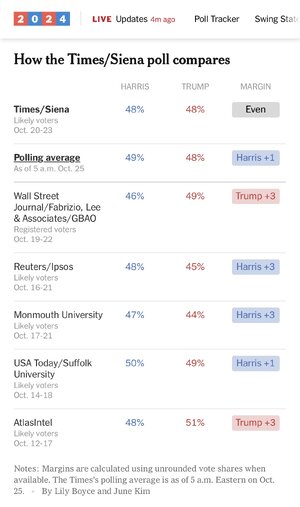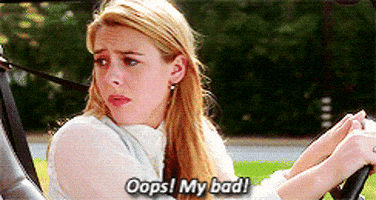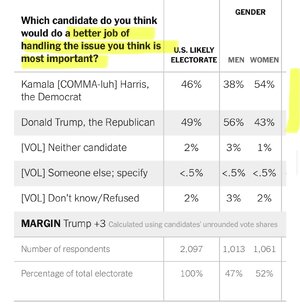- Messages
- 40,639
(Cont’d)
“… There are glimmers of hope in this final national poll for both Mr. Trump and Ms. Harris.
For Mr. Trump it is immigration: 15 percent of respondents named immigration as their top issue, up from 12 percent. … Voters by an 11-point margin said they trusted Mr. Trump more than Ms. Harris to deal with immigration.
… The percentage of Americans who said that Mr. Trump, who is 78, is too old to be president remained at 41 percent, essentially unchanged from July even after a series of rambling campaign speeches and appearances led to a swell of questions, including direct criticism from Ms. Harris, about the former president’s mental acuity and fitness.
… [Harris] has narrowed the gap with Mr. Trump on the economy, which remains the top issue for voters. Mr. Trump had a 13-point edge over Ms. Harris on which candidate could better manage the economy in the poll last month. That has shrunk to 6 percentage points.
… Ms. Harris also has a 16-point lead over Mr. Trump on which candidate would do a better job in protecting abortion access. …
About 15 percent of voters described themselves as not fully decided, and Ms. Harris is leading with that group, 42 percent to 32 percent. Two weeks ago, Mr. Trump had a minute edge with undecided or persuadable voters, 36 percent to 35 percent.
… The poll found that the 9 percent of Americans who said they already had voted leaned heavily toward Ms. Harris, 59 percent to 40 percent. That is consistent with the advantage Democrats have historically had in early voting and mail voting, though there are signs this year that Republicans, unlike in 2020, are casting early ballots in unusually heavy numbers. …”
“… There are glimmers of hope in this final national poll for both Mr. Trump and Ms. Harris.
For Mr. Trump it is immigration: 15 percent of respondents named immigration as their top issue, up from 12 percent. … Voters by an 11-point margin said they trusted Mr. Trump more than Ms. Harris to deal with immigration.
… The percentage of Americans who said that Mr. Trump, who is 78, is too old to be president remained at 41 percent, essentially unchanged from July even after a series of rambling campaign speeches and appearances led to a swell of questions, including direct criticism from Ms. Harris, about the former president’s mental acuity and fitness.
… [Harris] has narrowed the gap with Mr. Trump on the economy, which remains the top issue for voters. Mr. Trump had a 13-point edge over Ms. Harris on which candidate could better manage the economy in the poll last month. That has shrunk to 6 percentage points.
… Ms. Harris also has a 16-point lead over Mr. Trump on which candidate would do a better job in protecting abortion access. …
About 15 percent of voters described themselves as not fully decided, and Ms. Harris is leading with that group, 42 percent to 32 percent. Two weeks ago, Mr. Trump had a minute edge with undecided or persuadable voters, 36 percent to 35 percent.
… The poll found that the 9 percent of Americans who said they already had voted leaned heavily toward Ms. Harris, 59 percent to 40 percent. That is consistent with the advantage Democrats have historically had in early voting and mail voting, though there are signs this year that Republicans, unlike in 2020, are casting early ballots in unusually heavy numbers. …”





